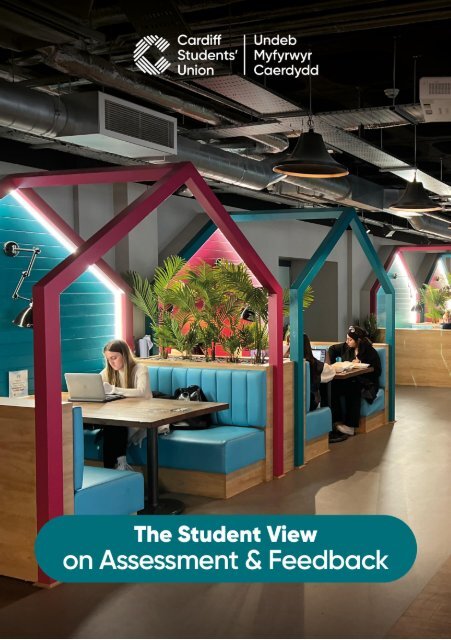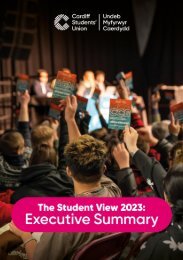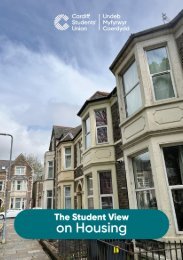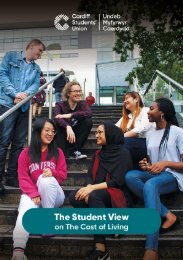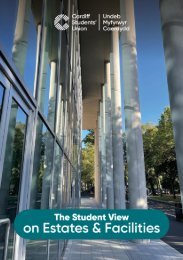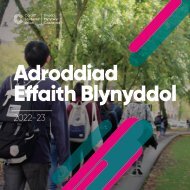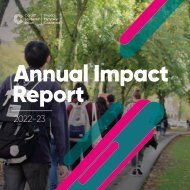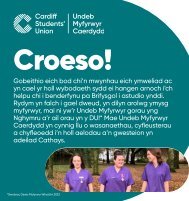The Student View on Assessment and Feedback 2023
- No tags were found...
Create successful ePaper yourself
Turn your PDF publications into a flip-book with our unique Google optimized e-Paper software.
1
C<strong>on</strong>tents<br />
1. A Word from the <str<strong>on</strong>g>Student</str<strong>on</strong>g>s' Uni<strong>on</strong> President… Page 3<br />
2. An Introducti<strong>on</strong>: <str<strong>on</strong>g>Student</str<strong>on</strong>g> <str<strong>on</strong>g>View</str<strong>on</strong>g> <strong>on</strong> <strong>Assessment</strong> & <strong>Feedback</strong>… Page 4<br />
3. <str<strong>on</strong>g>The</str<strong>on</strong>g> Data… Page 5<br />
4. <strong>Feedback</strong> Quality… Page 7<br />
5. <strong>Assessment</strong> Scheduling… Page 9<br />
6. <strong>Assessment</strong> Guidance… Page 10<br />
7. <strong>Assessment</strong> Types & Changes… Page 11<br />
8. Extenuating Circumstances & Appeals… Page 12<br />
9. Strikes… Page 13<br />
10. Artificial Intelligence… Page 13<br />
11. Recommendati<strong>on</strong>s… Page 14<br />
- 2 -
Gina Dunn<br />
<str<strong>on</strong>g>Student</str<strong>on</strong>g>s’ Uni<strong>on</strong> President<br />
<str<strong>on</strong>g>Student</str<strong>on</strong>g> feedback provides the University<br />
<strong>and</strong> <str<strong>on</strong>g>Student</str<strong>on</strong>g>s' Uni<strong>on</strong> with the framework to<br />
improve, enhance <strong>and</strong> shape the<br />
experience of being a student at Cardiff.<br />
Each year, the <str<strong>on</strong>g>Student</str<strong>on</strong>g>s' Uni<strong>on</strong> collects<br />
feedback through campaigns such as<br />
Speak Week, where we ask students what<br />
they would keep <strong>and</strong> change if they ran<br />
the university, <strong>and</strong> through <str<strong>on</strong>g>Student</str<strong>on</strong>g> Staff<br />
Panels <strong>and</strong> College Fora. We then collate<br />
that feedback <strong>and</strong> submit it to the<br />
University in a document called <str<strong>on</strong>g>The</str<strong>on</strong>g> <str<strong>on</strong>g>Student</str<strong>on</strong>g> <str<strong>on</strong>g>View</str<strong>on</strong>g>.<br />
Last year, we decided to change the way we approach <str<strong>on</strong>g>The</str<strong>on</strong>g> <str<strong>on</strong>g>Student</str<strong>on</strong>g> <str<strong>on</strong>g>View</str<strong>on</strong>g> <strong>and</strong> in turn, our<br />
approach to partnership. In order to focus our efforts, we submitted four 'mini' <str<strong>on</strong>g>Student</str<strong>on</strong>g><br />
<str<strong>on</strong>g>View</str<strong>on</strong>g>s that home in <strong>on</strong> specific themes, rather than addressing all aspects of feedback<br />
we collected over the year.<br />
This year we have c<strong>on</strong>tinued in that way, submitting <strong>on</strong>e in-year <str<strong>on</strong>g>Student</str<strong>on</strong>g> <str<strong>on</strong>g>View</str<strong>on</strong>g> in<br />
December, <strong>on</strong> the Cost of Living, <strong>and</strong> three more at the end of the year focusing <strong>on</strong> key<br />
areas that have arisen through data collecti<strong>on</strong> throughout the year.<br />
<strong>Assessment</strong> <strong>and</strong> feedback are low scorers year after year in the NSS <strong>and</strong> always come<br />
through in Speak Week comments <strong>and</strong> SSPs. <str<strong>on</strong>g>The</str<strong>on</strong>g> <str<strong>on</strong>g>Student</str<strong>on</strong>g> <str<strong>on</strong>g>View</str<strong>on</strong>g> <strong>on</strong> <strong>Assessment</strong> <strong>and</strong><br />
<strong>Feedback</strong> collates that feedback <strong>and</strong> highlights recommendati<strong>on</strong>s <strong>on</strong> what can be d<strong>on</strong>e<br />
to improve the student experience in this area.<br />
- 3 -
<str<strong>on</strong>g>The</str<strong>on</strong>g> <str<strong>on</strong>g>Student</str<strong>on</strong>g> <str<strong>on</strong>g>View</str<strong>on</strong>g> <strong>on</strong> <strong>Assessment</strong> & <strong>Feedback</strong><br />
Introducti<strong>on</strong><br />
<strong>Assessment</strong> <strong>and</strong> feedback are the back b<strong>on</strong>es of the academic student experience. <str<strong>on</strong>g>The</str<strong>on</strong>g>y<br />
challenge students to develop new ideas or c<strong>on</strong>cepts, keep learners engaged <strong>and</strong> most<br />
importantly encourage improvement within the learner. Each assessment is a learning<br />
opportunity, giving students the opportunity to gauge their level of competence allowing<br />
them to better underst<strong>and</strong> how they learn <strong>and</strong> study. However, assessments are much more<br />
than that to students. Often, they come h<strong>and</strong> in h<strong>and</strong> with stress <strong>and</strong> anxiety <strong>and</strong> feel more<br />
like a hurdle than an opportunity to learn. For students’ sentiment to shift when it comes to<br />
assessments, equal c<strong>on</strong>siderati<strong>on</strong> must be given to what happens before, during <strong>and</strong> after<br />
they take place. <str<strong>on</strong>g>The</str<strong>on</strong>g> assessment experience of a student starts during the teaching period<br />
<strong>and</strong> c<strong>on</strong>tinues until progressi<strong>on</strong> has occurred. This is a l<strong>on</strong>g process where students have to<br />
juggle university life with the uncertainty of how their performance will look, <strong>and</strong> whether they<br />
will progress to the next stage in their academic journey.<br />
While students put more emphasis <strong>on</strong> how they will be assessed, receiving feedback should<br />
be seen as something that is just as important, if not more so. <strong>Assessment</strong> without<br />
appropriate <strong>and</strong> c<strong>on</strong>structive feedback has no value. It is important to c<strong>on</strong>sider how students<br />
engage with the feedback they receive as it usually travels in a <strong>on</strong>e-way system, <strong>and</strong> it is<br />
often received too late. This leads to a gap in underst<strong>and</strong>ing their performance, which in turn<br />
reduces the opportunity for a student to learn from that assessment.<br />
Over the last couple of years, assessment <strong>and</strong> feedback in the higher educati<strong>on</strong> sphere has<br />
undertaken a significant transformati<strong>on</strong>. <str<strong>on</strong>g>The</str<strong>on</strong>g> accelerati<strong>on</strong> of digital tools in the wake of a<br />
global p<strong>and</strong>emic saw students being assessed in settings that would have never been<br />
c<strong>on</strong>sidered in the past. This challenged the way in which assessments were delivered,<br />
resulting in more authentic assessments being created <strong>and</strong> a more inclusive learning<br />
community developing in HE instituti<strong>on</strong>s. Equally, it has also brought some challenges with it.<br />
Academic integrity has greatly been impacted across the sector, <strong>and</strong> Cardiff University has<br />
not been Immune to this.<br />
<str<strong>on</strong>g>The</str<strong>on</strong>g> <str<strong>on</strong>g>Student</str<strong>on</strong>g> <str<strong>on</strong>g>View</str<strong>on</strong>g> <strong>on</strong> <strong>Assessment</strong> <strong>and</strong> <strong>Feedback</strong> will cover five aspects of the assessment<br />
experience, <strong>and</strong> make relevant recommendati<strong>on</strong>s based <strong>on</strong> what current <strong>and</strong> past students<br />
have told us. This will include students' views <strong>on</strong> assessment bunching, blended delivery,<br />
<strong>and</strong> timely feedback. However, it will also begin to wrestle with some of the newest<br />
challenges facing Higher Educati<strong>on</strong>, including Artificial Intelligence.<br />
Compared to previous years, there was a much smaller number of students commenting <strong>on</strong><br />
academic issues. In both of the Speak Week reports from 2021 <strong>and</strong> 2022, academic issues<br />
were the primary theme, but this was not the case in <strong>2023</strong>. This decrease could be<br />
attributed to how socio-ec<strong>on</strong>omic <strong>and</strong> envir<strong>on</strong>mental factors such as Covid-19 <strong>and</strong> the Costof-Living<br />
Crisis have impacted students, shifting their priorities as their basic needs are not<br />
being met. Although academic issues were less prevalent in Speak Week <strong>2023</strong>, now more<br />
than ever we need to prioritise creating a progressive <strong>and</strong> supportive assessment <strong>and</strong><br />
feedback framework so that students can learn effectively <strong>and</strong> are able to utilise what they<br />
have learned to support them later in life.<br />
- 4 -
<str<strong>on</strong>g>The</str<strong>on</strong>g> Data<br />
In Speak Week 1, academic issues were <strong>on</strong>ly the third most popular theme. This theme<br />
looks at feedback <strong>on</strong> topics such as academic courses, lectures, assessments, <strong>and</strong><br />
communicati<strong>on</strong>. In particular, the dominant sub-themes were about lectures (134<br />
comments) <strong>and</strong> assessments (99 comments).<br />
At the beginning of the sec<strong>on</strong>d semester, Speak Week 2 showed a large number of<br />
students experiencing problems receiving their timetable, with students noting lateness<br />
of delivery as well as problems with their reliability. <str<strong>on</strong>g>The</str<strong>on</strong>g> sub-theme of timetabling<br />
received 56 comments in Speak Week 1 <strong>and</strong> 84 in Speak Week 2, representing a 272%<br />
increase, proporti<strong>on</strong>ally.<br />
<str<strong>on</strong>g>The</str<strong>on</strong>g> sub-theme of academic events also had a notable 213% increase. <str<strong>on</strong>g>The</str<strong>on</strong>g> results<br />
suggest that as students engaged with academic events throughout the year, they<br />
wanted to be able to participate in more. <str<strong>on</strong>g>The</str<strong>on</strong>g>re were also increases in the number of<br />
comments referring to placements as well as the call for a university-wide reading week.<br />
With regards to placements, there was a 133% increase in the number of comments,<br />
with students dem<strong>and</strong>ing greater aut<strong>on</strong>omy, more support <strong>and</strong> reimbursement for the<br />
work d<strong>on</strong>e. Similarly, to placements, there was a 92% increase in students asking for a<br />
reading week. <str<strong>on</strong>g>The</str<strong>on</strong>g> table below summarises Speak Week comments by sub-theme.<br />
Table 1 Academic comments by sub-themes<br />
Academic:<br />
Academic Events<br />
(38 comments)<br />
<strong>Assessment</strong>s<br />
(99 comments)<br />
Learning Central<br />
(15 comments)<br />
Timetabling<br />
(56 comments)<br />
<str<strong>on</strong>g>Student</str<strong>on</strong>g>s showed an interest in existing academic events run<br />
by schools, <strong>and</strong> expressed a wish to see further events, such<br />
as external speakers, documentary screenings, <strong>and</strong><br />
networking events.<br />
Comments dem<strong>on</strong>strated a c<strong>on</strong>cern from students who have<br />
multiple deadlines at the same time, <strong>and</strong> a wish to see them<br />
distributed better over time. <str<strong>on</strong>g>Student</str<strong>on</strong>g>s indicated a positive<br />
resp<strong>on</strong>se to <strong>on</strong>line exams, but there were instances where<br />
students expressed dissatisfacti<strong>on</strong> at not receiving feedback<br />
<strong>on</strong> time.<br />
Comments received about Learning Central were mixed, with<br />
some students providing positive feedback, but others<br />
suggesting the system is difficult to navigate.<br />
Timetabling received a significant number of resp<strong>on</strong>ses, with<br />
students who provided comments wanting to see timetables<br />
released earlier.<br />
5
Lectures<br />
(134 comments)<br />
Placements<br />
(16 comments)<br />
Reading Week<br />
(31 comments)<br />
Extenuating Circumstances<br />
(24 comments)<br />
<str<strong>on</strong>g>The</str<strong>on</strong>g>re were a lot of positive comments about lectures,<br />
including lecture c<strong>on</strong>tent <strong>and</strong> support from lecturers.<br />
However, some comments indicated that the recording of<br />
lectures was not c<strong>on</strong>sistent, <strong>and</strong> that lectures often started<br />
late <strong>and</strong> did not make the most of the time available.<br />
<str<strong>on</strong>g>Student</str<strong>on</strong>g>s commented <strong>on</strong> the significant cost of being <strong>on</strong><br />
placement <strong>and</strong> expressed a desire to be paid for the work<br />
d<strong>on</strong>e <strong>on</strong> placement. <str<strong>on</strong>g>The</str<strong>on</strong>g>y also indicated they would like<br />
more specific support while <strong>on</strong> placement.<br />
<str<strong>on</strong>g>Student</str<strong>on</strong>g>s from a range of subject areas expressed a desire<br />
to have a university-wide reading week.<br />
<str<strong>on</strong>g>The</str<strong>on</strong>g>re was a feeling am<strong>on</strong>g students that the extenuating<br />
circumstances policy needs to revert back to two weeks, <strong>and</strong><br />
that the appeals process should be quicker, so students do<br />
not need to re-sit assessments unnecessarily.<br />
<str<strong>on</strong>g>Student</str<strong>on</strong>g>-Staff Panels across the University also played particular attenti<strong>on</strong> to assessment<br />
<strong>and</strong> feedback. <str<strong>on</strong>g>The</str<strong>on</strong>g>se discussi<strong>on</strong>s often related to assessment guidelines, support <strong>and</strong><br />
study skills. <str<strong>on</strong>g>Student</str<strong>on</strong>g>s expressed a desire for clear guidance <strong>and</strong> help with preparing for<br />
in-pers<strong>on</strong> exams <strong>and</strong> essays, with students particularly interested in support with the<br />
transiti<strong>on</strong> back to face-to-face exams.<br />
This <str<strong>on</strong>g>Student</str<strong>on</strong>g> <str<strong>on</strong>g>View</str<strong>on</strong>g> looks to examine some of these key themes in more detail. Based <strong>on</strong><br />
the feedback received this year, this <str<strong>on</strong>g>Student</str<strong>on</strong>g> <str<strong>on</strong>g>View</str<strong>on</strong>g> will focus <strong>on</strong> five main themes:<br />
<strong>Feedback</strong> Quality, <strong>Assessment</strong> Scheduling, Guidance, Types, <strong>and</strong> Extenuating<br />
Circumstances. It will also include a note of emerging challenges during the academic<br />
year 22/23 such as the effect of strike acti<strong>on</strong> <strong>and</strong> the release of the Artificial Intelligence<br />
(AI) tool chatGPT.<br />
6
<strong>Feedback</strong> Quality<br />
Cardiff University’s ‘Academic <strong>Feedback</strong> to Taught <str<strong>on</strong>g>Student</str<strong>on</strong>g>s’(AFtTS) policy <strong>and</strong> guidance<br />
document is based <strong>on</strong> the following principles:<br />
1. <strong>Feedback</strong> supports <strong>and</strong> promotes effective learning.<br />
2. <strong>Feedback</strong> is a c<strong>on</strong>tinuous process.<br />
3. <strong>Feedback</strong> needs to be suited to individual students’ needs.<br />
<str<strong>on</strong>g>The</str<strong>on</strong>g>se principles underpin the policy <strong>and</strong> should be the basis of the feedback provided at<br />
Cardiff University, however, in this secti<strong>on</strong> of the report, we will explore how the data we<br />
have obtained through Speak Week, <str<strong>on</strong>g>Student</str<strong>on</strong>g>-Staff Panels <strong>and</strong> College Fora show that<br />
from a student perspective, the guidelines stipulated in the policy based <strong>on</strong> principle 1<br />
are not being followed.<br />
Speak Week data <strong>on</strong> assessment <strong>and</strong> feedback highlights students’ dissatisfacti<strong>on</strong> at<br />
not receiving feedback <strong>on</strong> time, <strong>and</strong> others stated that they would like to receive more<br />
feedback. Comments such as the <strong>on</strong>es below show students’ sentiments regarding this<br />
matter.<br />
"<strong>Feedback</strong> <strong>on</strong> some assessments is too late <strong>and</strong> close to exams so no time to appeal marks<br />
due to upcoming exams priority" (Undergraduate, BISOCI, Year 3 <str<strong>on</strong>g>Student</str<strong>on</strong>g>)<br />
"<strong>Feedback</strong> for assessments needs to be in greater depth" (Undergraduate, HCARE, Year 3<br />
<str<strong>on</strong>g>Student</str<strong>on</strong>g>)<br />
On occasi<strong>on</strong>s where assessment feedback was discussed during <str<strong>on</strong>g>Student</str<strong>on</strong>g>-Staff Panels,<br />
students indicated that there is room for improvement <strong>and</strong> would like to see changes to<br />
the time in which assessment feedback is delivered, as they want to be able to use their<br />
feedback to tailor their preparati<strong>on</strong> for upcoming assessments. Some of the comments<br />
include menti<strong>on</strong>s of the accessibility of feedback, feedback received too close to<br />
upcoming deadlines, <strong>and</strong> the desire to use feedback as a tool for improvement.<br />
"Often the feedback Is not easy for students to access" (<str<strong>on</strong>g>Student</str<strong>on</strong>g>-Staff Panel Minutes, CHEMY<br />
Undergraduate)<br />
"<str<strong>on</strong>g>Student</str<strong>on</strong>g>s want feedback to offer correcti<strong>on</strong>s to their mistakes." (<str<strong>on</strong>g>Student</str<strong>on</strong>g>-Staff Panel Minutes,<br />
MLANG Undergraduate)<br />
"<str<strong>on</strong>g>Student</str<strong>on</strong>g>s appreciate early feedback <strong>on</strong> assessments, before new assessments are set so<br />
they are able to improve from the comments <strong>and</strong> feedback." (<str<strong>on</strong>g>Student</str<strong>on</strong>g>-Staff Panel Minutes,<br />
HCARE Postgraduate Taught)<br />
‘Release of results from coursework, never released <strong>on</strong> the date they say they will (means<br />
we're c<strong>on</strong>stantly waiting l<strong>on</strong>ger than we should)’ (Undergraduate, BIOSCI, Year 3 <str<strong>on</strong>g>Student</str<strong>on</strong>g>)<br />
Lateness in receiving assessment feedback is the major c<strong>on</strong>tributing factor to students’<br />
disc<strong>on</strong>tent. We believe that this time element has a significant impact <strong>on</strong> the students’<br />
perceived quality of the feedback they receive, due to the inability of implementing the<br />
feedback as well as the limitati<strong>on</strong>s to reflect <strong>on</strong> their submissi<strong>on</strong>s due to the passing of<br />
7
time. In the focus group findings of the recent ‘<str<strong>on</strong>g>Student</str<strong>on</strong>g> Experience <strong>and</strong> NSS Result<br />
Enhancement Project’, students were asked about their schools’ turnaround time for<br />
marked work. <str<strong>on</strong>g>The</str<strong>on</strong>g> results showed that <strong>on</strong>ly 7% of the participants were aware of the 20-<br />
working day policy of the University, meaning that most students’ expectati<strong>on</strong>s are not<br />
being met.<br />
Generally, students feel dissatisfied with the quality of the feedback they receive,<br />
primarily due to lateness in receiving feedback having a knock-<strong>on</strong> effect <strong>on</strong> their<br />
academic performance. <str<strong>on</strong>g>Student</str<strong>on</strong>g>s do not have enough time to reflect <strong>and</strong> implement<br />
changes to their revisi<strong>on</strong> technique or assessment strategy, <strong>and</strong> thus feedback would<br />
not be promoting or supporting effective learning, as stated <strong>on</strong> Principle 1 of the AFtTS.<br />
This is in line with the 2022 NSS results <strong>on</strong> Questi<strong>on</strong> 11, as seen in the table below.<br />
NSS 2022 Cardiff University Sector Wales<br />
Russell<br />
Group[1]<br />
2021 2022 2021 2022 2021 2022 2021 2022<br />
<strong>Assessment</strong> <strong>and</strong><br />
<strong>Feedback</strong><br />
59.77 62.69 68.59 68.53 69.46 69.59 62.17 60.49<br />
NSS Scale Questi<strong>on</strong>/Scale Significance<br />
<strong>Assessment</strong> <strong>and</strong><br />
feedback<br />
9. Marking <strong>and</strong><br />
assessment has<br />
been fair.<br />
Significantly below benchmark<br />
<strong>Assessment</strong> <strong>and</strong><br />
feedback<br />
11. I have received<br />
helpful comments<br />
<strong>on</strong> my work. Significantly below benchmark<br />
Figure 1 Cardiff University NSS scores below benchmark for assessment <strong>and</strong> feedback<br />
In summary, the data collated <strong>on</strong> assessment feedback shows that there are three<br />
factors that students would like to see reflected through their feedback, <strong>and</strong> would<br />
c<strong>on</strong>stitute as good-quality feedback: timely, c<strong>on</strong>structive, <strong>and</strong> accessible. C<strong>on</strong>sistency<br />
across schools is also desirable, however, this is challenging due to different teaching<br />
<strong>and</strong> marking styles of academic staff <strong>and</strong> diversity of assessment types. N<strong>on</strong>etheless,<br />
this disparity could be reduced through the use of a st<strong>and</strong>ard marking framework.<br />
<str<strong>on</strong>g>The</str<strong>on</strong>g> current AFtTS policy was last updated in 2015. As the l<strong>and</strong>scape of educati<strong>on</strong> has<br />
changed significantly over the last few years, it is imperative that this policy is updated to<br />
reflect those changes, as well as to ensure that guidelines are still relevant. We believe<br />
that students should become familiar with the AFtTS policy <strong>and</strong> guidance to ensure they<br />
feel empowered to fulfil their resp<strong>on</strong>sibilities as stated in the policy, as well as to<br />
advocate for themselves should they not receive the quality of feedback they expect. <str<strong>on</strong>g>The</str<strong>on</strong>g><br />
existing rapport <strong>and</strong> trust between students <strong>and</strong> their academic school should be used<br />
as an advantage point for engagement, as well as reassurance that the informati<strong>on</strong><br />
shared is applicable to the individual student. It should also be noted that resources <strong>and</strong><br />
informati<strong>on</strong> <strong>on</strong> assessment feedback should be readily available to students.<br />
8
<strong>Assessment</strong> Scheduling<br />
Year <strong>on</strong> year students c<strong>on</strong>tinue to voice disc<strong>on</strong>tent with the scheduling of assessments.<br />
This includes the release of exam timetables, assessment bunching for exams <strong>and</strong><br />
coursework.<br />
<str<strong>on</strong>g>The</str<strong>on</strong>g> Cardiff <strong>Assessment</strong> <strong>and</strong> <strong>Feedback</strong> Commitments document recognises that working<br />
in partnership with students <strong>and</strong> staff is essential to develop changes in this area <strong>and</strong> to<br />
ensure that commitments are being met. <str<strong>on</strong>g>The</str<strong>on</strong>g> document states the following:<br />
<str<strong>on</strong>g>The</str<strong>on</strong>g> assessments that are set …<br />
i. <strong>Assessment</strong>s will be relevant to the course <strong>and</strong> designed to promote learning,<br />
curiosity, <strong>and</strong> critical thinking, <strong>and</strong> to measure achievement of the course<br />
learning outcomes.<br />
ii. <strong>Assessment</strong>s of the same method <strong>and</strong> weighting (e.g. case studies / essays /<br />
exams) will be c<strong>on</strong>sistent in length within individual courses.<br />
iii. <str<strong>on</strong>g>The</str<strong>on</strong>g> assessment load will be spread appropriately to ensure sufficient time is<br />
available for: - students to engage in learning <strong>and</strong> complete tasks to the best of<br />
their ability. - staff to manage assessment <strong>and</strong> deliver high quality <strong>and</strong> timely<br />
feedback that will feed forward to future tasks.<br />
Point 3 of commitment 2 <strong>on</strong> setting assessments talks about assessments being spread<br />
appropriately to ensure student engagement <strong>and</strong> staff management of the assessment.<br />
Based <strong>on</strong> student feedback from Speak Week <strong>and</strong> <str<strong>on</strong>g>Student</str<strong>on</strong>g>-Staff Panels, we believe that<br />
students do not feel that this commitment reflects their experiences.<br />
Comments dem<strong>on</strong>strated a c<strong>on</strong>cern from students who wish to receive exam timetables<br />
earlier, <strong>and</strong> for assessments to be better distributed over time. <str<strong>on</strong>g>The</str<strong>on</strong>g> following quotes<br />
illustrate the general frustrati<strong>on</strong> <strong>and</strong> upset:<br />
‘‘Release exam timetables earlier" (Undergraduate, PHRMY, Year 1 <str<strong>on</strong>g>Student</str<strong>on</strong>g>)<br />
‘‘More even distributi<strong>on</strong> of assessment deadlines, especially in term 2" (Undergraduate,<br />
SHARE, Year 3)<br />
During <str<strong>on</strong>g>Student</str<strong>on</strong>g>-Staff Panels, many of the discussi<strong>on</strong>s surrounding assessment<br />
scheduling highlight issues between coursework deadlines <strong>and</strong> exam deadlines being<br />
too close in time, issues with assessment bunching predominantly occurring in the<br />
sec<strong>on</strong>d semester, <strong>and</strong> having coursework deadlines <strong>on</strong> the same day. <str<strong>on</strong>g>The</str<strong>on</strong>g>re is an overall<br />
sentiment that these issues have a great impact <strong>on</strong> the academic experience of<br />
students, as it can influence students’ performance during assessments <strong>and</strong><br />
repercussi<strong>on</strong>s <strong>on</strong> students’ mental health, due to high levels of stress in short periods of<br />
time which might also lead to burnout.<br />
We would like to see a more c<strong>on</strong>sistent implementati<strong>on</strong> of the Cardiff <strong>Assessment</strong> <strong>and</strong><br />
<strong>Feedback</strong> Commitments highlighted as a short-term improvement. However, work should<br />
be undertaken to revise <strong>and</strong> update the commitments based <strong>on</strong> the new l<strong>and</strong>scape of<br />
assessment methods implemented after the p<strong>and</strong>emic. For example, the shift from<br />
exams to coursework as a preferred assessment method for some courses.<br />
9
<strong>Assessment</strong> Guidance<br />
One large point of feedback we received from students during Speak Week was an<br />
overall lack of guidance when it came to examinati<strong>on</strong>s. <str<strong>on</strong>g>Student</str<strong>on</strong>g>s pointed out the fact that<br />
they often felt underprepared for examinati<strong>on</strong>s <strong>and</strong> would be caught out, often feeling<br />
that their knowledge <strong>and</strong> aptitude was not properly tested due to this. More access to<br />
graded example essays <strong>and</strong> exam questi<strong>on</strong> preparati<strong>on</strong> during the course, as well as<br />
better transparency as to how marks were being awarded, were cited as ways students<br />
would like improvement when it comes to exam guidance.<br />
Over 25% of our feedback collated from <str<strong>on</strong>g>Student</str<strong>on</strong>g>-Staff Panels regarding assessments<br />
focussed <strong>on</strong> a lack of guidance in some respect. Some cited better guidance <strong>on</strong><br />
assessments <strong>and</strong> examinati<strong>on</strong>s as an accessibility issue, others simply did not feel<br />
adequately prepared for writing assessments <strong>and</strong> completing examinati<strong>on</strong>s because not<br />
enough support was given during the year <strong>on</strong> the subject.<br />
‘‘More exam questi<strong>on</strong> prep + more exam essay examples (graded)" (Undergraduate, BIOSI,<br />
Year 3)<br />
‘‘More workshops where we answer questi<strong>on</strong>s together" (Undergraduate, BIOSI, Year 3)<br />
‘‘<str<strong>on</strong>g>Student</str<strong>on</strong>g>s could benefit from more guidance <strong>on</strong> assessments." (<str<strong>on</strong>g>Student</str<strong>on</strong>g>-Staff Panel Minutes,<br />
PSYCH Postgraduate Research)<br />
‘‘<str<strong>on</strong>g>Student</str<strong>on</strong>g>s would appreciate more <strong>Assessment</strong> Support <strong>and</strong> guidance such as mock exams<br />
<strong>and</strong> essays" (<str<strong>on</strong>g>Student</str<strong>on</strong>g>-Staff Panel Minutes, MEDIC Undergraduate Research)<br />
‘‘<str<strong>on</strong>g>Student</str<strong>on</strong>g>s want more practice <strong>on</strong> subject specific questi<strong>on</strong>s. Can there be a practice test?”<br />
(<str<strong>on</strong>g>Student</str<strong>on</strong>g>-Staff Panel Minutes, EARTH Undergraduate)<br />
We would recommend a greater focus <strong>on</strong> exam preparati<strong>on</strong> within the curriculum going<br />
forward, including time going over essay preparati<strong>on</strong> when relevant as st<strong>and</strong>ard practise<br />
to ensure students are fully equipped to use <strong>and</strong> dem<strong>on</strong>strate their subject knowledge<br />
within assessments. Modules <strong>on</strong> Learning Central to help with writing essays <strong>and</strong><br />
preparing for exams would also be appreciated. A full review into how students are<br />
supported when it comes to completi<strong>on</strong> of assessments is recommended going forward.<br />
10
<strong>Assessment</strong> Types & Changes<br />
Coming out of the height of the COVID-19 p<strong>and</strong>emic, many aspects of higher educati<strong>on</strong><br />
were under questi<strong>on</strong>. While last year’s <str<strong>on</strong>g>Student</str<strong>on</strong>g> <str<strong>on</strong>g>View</str<strong>on</strong>g> had a keen focus <strong>on</strong> blended<br />
learning <strong>and</strong> how we could take the benefits of <strong>on</strong>line learning whilst providing a<br />
valuable face to face teaching experience for students, this year we saw a larger focus <strong>on</strong><br />
examinati<strong>on</strong>s <strong>and</strong> the somewhat uneven approach to the reintroducti<strong>on</strong> of face-to-face in<br />
the past year. <str<strong>on</strong>g>The</str<strong>on</strong>g> clear feeling from students was a hesitati<strong>on</strong> to return to the face-toface<br />
model prevalent before the p<strong>and</strong>emic, with many feeling that they were tested<br />
better <strong>on</strong> actual knowledge <strong>and</strong> skills with 24-hour <strong>on</strong>line assessments, or <strong>on</strong>line<br />
coursework-based modules. Accessibility is another key aspect here, with the NSS<br />
assessment <strong>and</strong> feedback agreement gap between students with <strong>and</strong> without known<br />
disabilities growing in the past year across the UK as face-to-face assessments start to<br />
resume.<br />
Over 10% of assessment <strong>and</strong> feedback data gathered from <str<strong>on</strong>g>Student</str<strong>on</strong>g>-Staff Panels referred<br />
to some level of discomfort or anxiety about face-to-face examinati<strong>on</strong>s resuming. <str<strong>on</strong>g>The</str<strong>on</strong>g>re<br />
was a clear sentiment of students feeling these examinati<strong>on</strong>s were not the best way to<br />
test knowledge of the subject <strong>and</strong> instead l<strong>on</strong>ger-term assessments were preferred,<br />
whether they be coursework or l<strong>on</strong>ger <strong>on</strong>line examinati<strong>on</strong>s. Our Speak Week data<br />
echoed this sentiment, with many students stressing frustrati<strong>on</strong> with elements of the<br />
transiti<strong>on</strong> back to in pers<strong>on</strong>.<br />
We recommend policy across colleges to prefer <strong>on</strong>line examinati<strong>on</strong>s <strong>and</strong> assessments<br />
for their students, for the modules which would allow it. This is beneficial both from an<br />
accessibility perspective, as well as suiting the anxieties felt by students about the<br />
antiquated nature of the in-pers<strong>on</strong> examinati<strong>on</strong> <strong>and</strong> the discomfort in returning to that<br />
model. We want our students to feel totally equipped to present their subject knowledge<br />
<strong>and</strong> skills when being assessed, <strong>and</strong> this seems to be the way forward catering to that<br />
perspective.<br />
11
Extenuating Circumstances & Appeals<br />
<str<strong>on</strong>g>The</str<strong>on</strong>g> 2022/23 academic year also saw the regressi<strong>on</strong> of Cardiff’s Extenuating<br />
Circumstances policy to its pre-p<strong>and</strong>emic state. This has been a major point of<br />
c<strong>on</strong>tenti<strong>on</strong> for students <strong>and</strong> has generally raised questi<strong>on</strong>s as to why we still use such an<br />
antiquated system.<br />
<str<strong>on</strong>g>Student</str<strong>on</strong>g>s are clearly displeased with the current state of policy, with all comments <strong>on</strong> the<br />
subject being negative about the change. With a mental health crisis in full effect <strong>and</strong><br />
students being heavily impacted by the Cost-of-Living crisis, we are in dire need for a<br />
policy which suitably helps those who are going through difficult situati<strong>on</strong>s which affect<br />
their ability to complete assessments.<br />
This is a clear accessibility issue for students which comes back to the growing gap in<br />
agreement between students with <strong>and</strong> without declared disabilities in the NSS when it<br />
comes to assessment <strong>and</strong> feedback.<br />
‘‘Extenuating circumstances are not clear for 48-hr exams" (<str<strong>on</strong>g>Student</str<strong>on</strong>g>-Staff Panel Minutes,<br />
ENCAP Postgraduate)<br />
‘‘Deadline extensi<strong>on</strong>s - 1 week is not always enough” (Undergraduate, GEOPL. Year 3 <str<strong>on</strong>g>Student</str<strong>on</strong>g>)<br />
We recommend a full review into how we can overhaul our Extenuating Circumstances<br />
policy moving forward, looking to other Russell Group Universities to evaluate the best<br />
practices across the sector. Cardiff <str<strong>on</strong>g>Student</str<strong>on</strong>g>s’ Uni<strong>on</strong> should have a clear voice in this<br />
matter as well as wellbeing staff from the university. <str<strong>on</strong>g>Student</str<strong>on</strong>g>s’ health <strong>and</strong> wellbeing is<br />
the utmost priority, <strong>and</strong> it should be treated as such in the field of assessment.<br />
12
External Factors<br />
Strikes<br />
While not a point within itself we thought it best to also menti<strong>on</strong> the <strong>on</strong>going UCU<br />
industrial acti<strong>on</strong> within this secti<strong>on</strong> of the <str<strong>on</strong>g>Student</str<strong>on</strong>g> <str<strong>on</strong>g>View</str<strong>on</strong>g> as it is reflected in the voices of<br />
students we spoke to. <str<strong>on</strong>g>The</str<strong>on</strong>g>re is a clear discomfort in how the university is h<strong>and</strong>ling the<br />
strikes across the student body. This includes a widespread sense of unpreparedness for<br />
the marking boycott, <strong>and</strong> a desire for the university to work more closely with its staff <strong>on</strong><br />
the matter. We implore the university to do better in its communicati<strong>on</strong>s with the UCU<br />
<strong>and</strong> do everything in its power to remain transparent with its student body. <str<strong>on</strong>g>The</str<strong>on</strong>g>re is an<br />
evident tensi<strong>on</strong> in the air over the subject <strong>and</strong> we would recommend the university make<br />
clear steps in the near future to diffuse that tensi<strong>on</strong> wherever possible.<br />
Artificial Intelligence<br />
Open AI’s artificial intelligence chatbot, ChatGPT, came into play towards the end of<br />
2022. This tool has caused many questi<strong>on</strong>s to be raised within the higher educati<strong>on</strong><br />
sphere. <str<strong>on</strong>g>The</str<strong>on</strong>g>se particularly focus <strong>on</strong> the potential use by students to c<strong>on</strong>duct academic<br />
misc<strong>on</strong>duct during assessments, however, there is a potential for students to benefit<br />
from this tool <strong>and</strong> use it to their advantage to enhance their learning. Similarly, there is<br />
an opportunity for academic staff to re-think assessment methods. While the role of this<br />
tool in HE is uncertain, it has presented instituti<strong>on</strong>s with an opportunity to shape how it’s<br />
use would look like. We believe that it is crucial for the university to take a proactive<br />
approach in this matter.<br />
Figure 2 <str<strong>on</strong>g>Student</str<strong>on</strong>g> Intranet search result of the term 'chatGPT'<br />
As seen above, currently, there is no guidance or informati<strong>on</strong> available to students<br />
through the <str<strong>on</strong>g>Student</str<strong>on</strong>g> Intranet in relati<strong>on</strong> to the use of chat GPT. Similar results appear<br />
when searching terms like ‘Artificial Intelligence’ or ‘AI’. While informati<strong>on</strong> might have<br />
been circulated to students through a school or e-mail, it must be accessible through the<br />
<str<strong>on</strong>g>Student</str<strong>on</strong>g> Intranet. Clear guidelines should be made available to students as so<strong>on</strong> as<br />
possible through the student intranet <strong>and</strong> the implementati<strong>on</strong> of this guidelines should<br />
be c<strong>on</strong>sistent across schools. <str<strong>on</strong>g>The</str<strong>on</strong>g>se guidelines would highlight ways in which students<br />
can use AI to support their learning <strong>and</strong> show examples of when the use of AI during an<br />
assessment would c<strong>on</strong>stitute as an academic misc<strong>on</strong>duct matter.<br />
13
Recommendati<strong>on</strong>s<br />
Recommendati<strong>on</strong> 1: <str<strong>on</strong>g>The</str<strong>on</strong>g> University should develop a tailored communicati<strong>on</strong> plan to<br />
address misc<strong>on</strong>cepti<strong>on</strong>s of assessment feedback turnaround.<br />
<str<strong>on</strong>g>The</str<strong>on</strong>g> plan should be developed in collaborati<strong>on</strong> with schools <strong>and</strong> <str<strong>on</strong>g>Student</str<strong>on</strong>g> Champi<strong>on</strong>s to<br />
address misc<strong>on</strong>cepti<strong>on</strong>s of assessment feedback turnaround timeframes <strong>and</strong> lack of<br />
awareness of the ‘Academic <strong>Feedback</strong> to Taught <str<strong>on</strong>g>Student</str<strong>on</strong>g>s’ policy am<strong>on</strong>gst students. This<br />
communicati<strong>on</strong>s plan should be executed at school level. Additi<strong>on</strong>ally, as part of the<br />
communicati<strong>on</strong>s plan, the policy <strong>and</strong> any others relevant should be ‘’1 click away’’ from<br />
the student <strong>on</strong> the student intranet. To achieve this, all informati<strong>on</strong> regarding<br />
assessment feedback should be c<strong>on</strong>densed in a single intranet page.<br />
Recommendati<strong>on</strong> 2: <str<strong>on</strong>g>The</str<strong>on</strong>g> University should update the current AFtTS policy in<br />
collaborati<strong>on</strong> with students <strong>and</strong> staff to ensure it is reflective of the experiences of<br />
the current student demographic <strong>and</strong> practices in the sector.<br />
Recommendati<strong>on</strong> 3: End assessment bunching by ensuring a minimum period of<br />
three working days between any deadline, or the automatic approval of extenuating<br />
circumstances where this is not possible.<br />
Recommendati<strong>on</strong> 4: Implement improvements to assessment support <strong>and</strong> guidance,<br />
with an emphasis <strong>on</strong> help with essay writing, administrative support for how to<br />
submit assessments <strong>and</strong> integrati<strong>on</strong> of assessment guidance into the curriculum.<br />
Recommendati<strong>on</strong> 5: Increase the availability of <strong>on</strong>line examinati<strong>on</strong>s for students<br />
both in the name of comfort <strong>and</strong> accessibility.<br />
Recommendati<strong>on</strong> 6: C<strong>on</strong>duct a review into how students’ knowledge <strong>and</strong> skills are<br />
tested in assessments, with the end goal of creating assessments not just for<br />
assessments’ sake, but also to allow students to show their skills <strong>and</strong> h<strong>on</strong>e their<br />
subject knowledge.<br />
14
- 15 -


